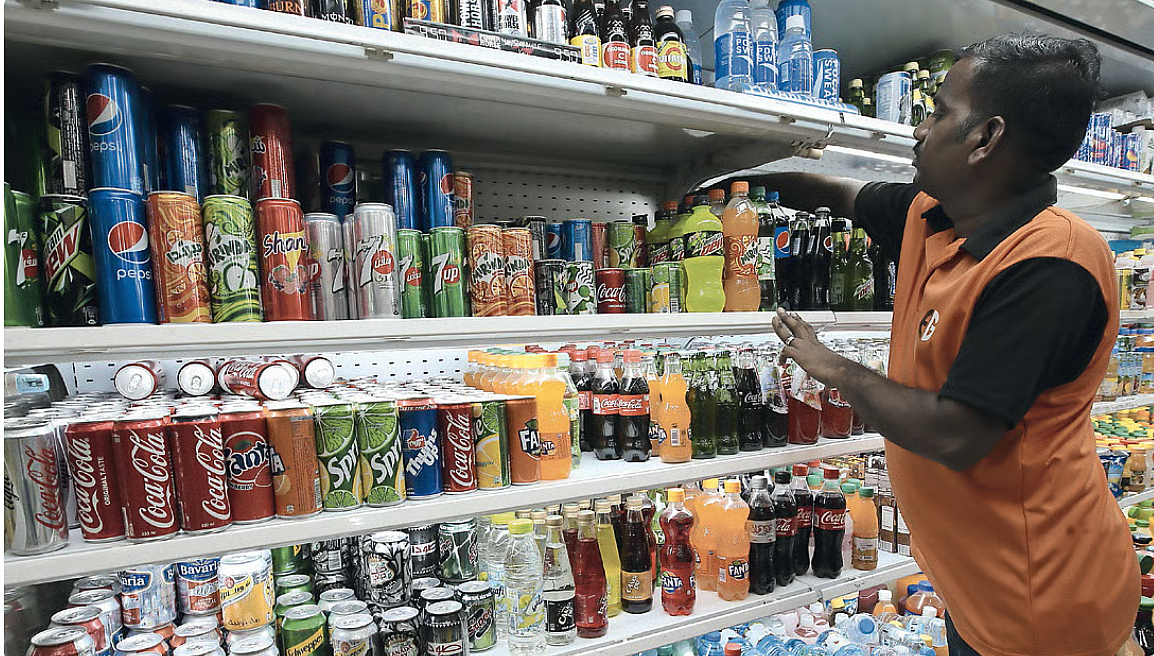Fighting Diabetes, Obesity: UAE Doctors List Benefits Of New Rule On Sweetened Drinks
Doctors and nutritionists are optimistic manufacturers will reduce the sugar content in their products as the UAE implements a selective tax on sugar-sweetened beverages (SSBs) starting early next year.“This is a commendable public health policy,” they underscored. They also warned, however, that consumers should not find an excuse to consume more sugary drinks.
“We have to limit the intake of sugar-sweetened drinks as much as possible, irrespective of the percentage of sugar content,” Dr Aswin Pankajakshan, consultant endocrinologist at Fakeeh University Hospital Dubai, underlined, noting the high prevalence of diabetes among the adult population in the country.
Recommended For You“Sugar-sweetened beverages are a major source of excess and hidden calories. Multiple studies have established the strong link between high consumption of sugary drinks and serious health problems like obesity, Type 2 diabetes, and cardiovascular disease. Reduced consumption will therefore translate to lower incidence of chronic diseases,” added Dr Pankajakshan.
Stay up to date with the latest news. Follow KT on WhatsApp Channels.
The reform announced on July 18 by the Ministry of Finance (MoF) and Federal Tax Authority (FTA) to implement a new tiered tax system beginning early 2026 that links the tax rate to the drink's sugar content is seen as part of a wider push to promote a healthier lifestyle.
Removing the one-size-fits-all levy that currently stands at 50 per cent excise tax to all carbonated drinks, as well as powdered and concentrated drink mixes, will incentivise manufacturers, suppliers, and importers to reduce sugar levels in their products.
Simply put - reduce the sugar content and enjoy lower taxes. This, in turn, would also benefit consumers with lower retail prices .
Positive health policy
“By linking the tax directly to the sugar content in sweetened beverages, we are encouraging manufacturers to reformulate products with lower sugar levels,” reiterated endocrinology consultant Dr Ahmed Abdul Karim Hassoun.
“This is a commendable public health policy," he underscored, noting:“This is particularly important in the fight against obesity, metabolic syndrome, and Type 2 diabetes – which are all increasing in the region.”
“Reducing added sugars in daily consumption can have a significant long-term impact on preventing these chronic conditions. To maximise the impact, this measure should be coupled with awareness campaigns to educate the public about the risks of excessive sugar intake,” he told Khaleej Times.
The government has earlier announced that active“awareness campaigns will be launched to ensure smooth and comprehensive understanding of the new mechanism. Businesses across the UAE will also be granted sufficient time to prepare for the updated mechanism while importers, manufacturers and suppliers will have sufficient time to adapt their systems and review product formulations.”
Sour situation
Reshma Devjani, clinical dietician at Fakeeh University Hospital Dubai, pointed out the high number of diabetics in the UAE and how sugary drinks contribute to the increasing number of diabetics.
“As per 2024 statistics available from the International Diabetes federation (IDF), the prevalence of diabetes among the UAE adult population is about 20.7 per cent. SSBs increase the risk of Type 2 diabetes primarily through weight gain and metabolic dysfunction,” she noted.
“SSBs, high in added sugars like sucrose or high-fructose corn syrup, contribute to excess calorie intake without promoting satiety, leading to weight gain. The high fructose can cause metabolic dysfunction, contributing to insulin resistance, impaired beta-cell function, and ultimately, an increased risk of Type 2 diabetes,” she added.
So, what is the allowable sugar level intake? For adults, Devjani said, it should be less than 10 per cent of total calories based on a 2000 kcal diet. This would translate to less than 50 grams of added sugars daily. A 12-ounce can of soda already contains 10 teaspoons (42 grams) of added sugar.
Devjani added:“Let the nutrition facts label be your guide to find out if your food has high sugar or low sugar content. Check the label to see if foods are low or high in added sugars.
“Reducing sugar content will help you to cut down on concentrated source of calories and carbohydrates. This could reduce your risk for weight gain and obesity, Type 2 diabetes, metabolic syndrome, dental caries, and heart problem.

Legal Disclaimer:
MENAFN provides the
information “as is” without warranty of any kind. We do not accept
any responsibility or liability for the accuracy, content, images,
videos, licenses, completeness, legality, or reliability of the information
contained in this article. If you have any complaints or copyright
issues related to this article, kindly contact the provider above.
Most popular stories
Market Research

- Japan Skin Care Products Market Size Worth USD 11.6 Billion By 2033 CAGR: 4.18%
- Permissionless Data Hub Baselight Taps Walrus To Activate Data Value Onchain
- Chaingpt Pad Unveils Buzz System: Turning Social Hype Into Token Allocation
- Newcastle United Announce Multi-Year Partnership With Bydfi
- PLPC-DBTM: Non-Cellular Oncology Immunotherapy With STIPNAM Traceability, Entering A Global Acquisition Window.
- Origin Summit Unveils Second Wave Of Global Icons Ahead Of Debut During KBW






















Comments
No comment